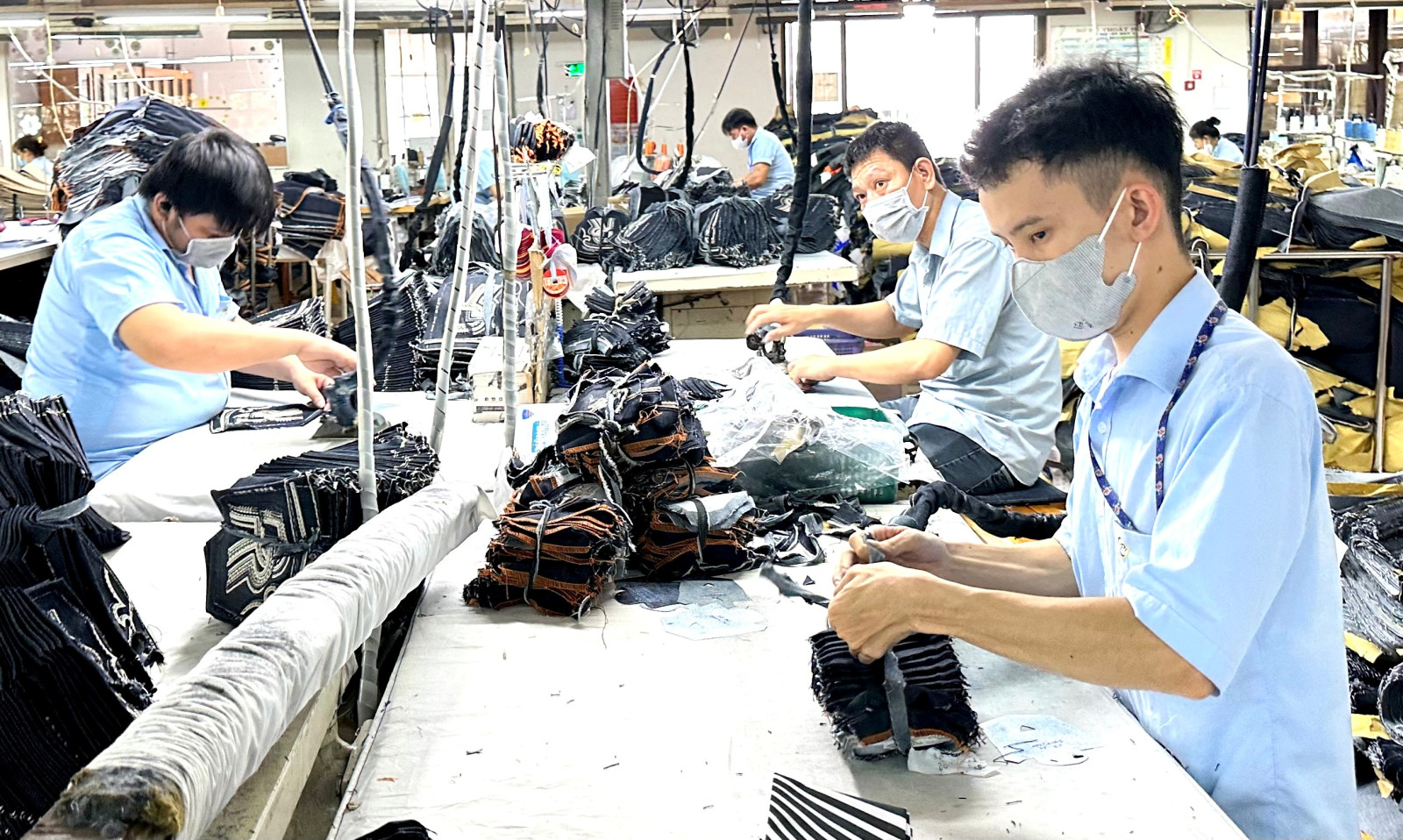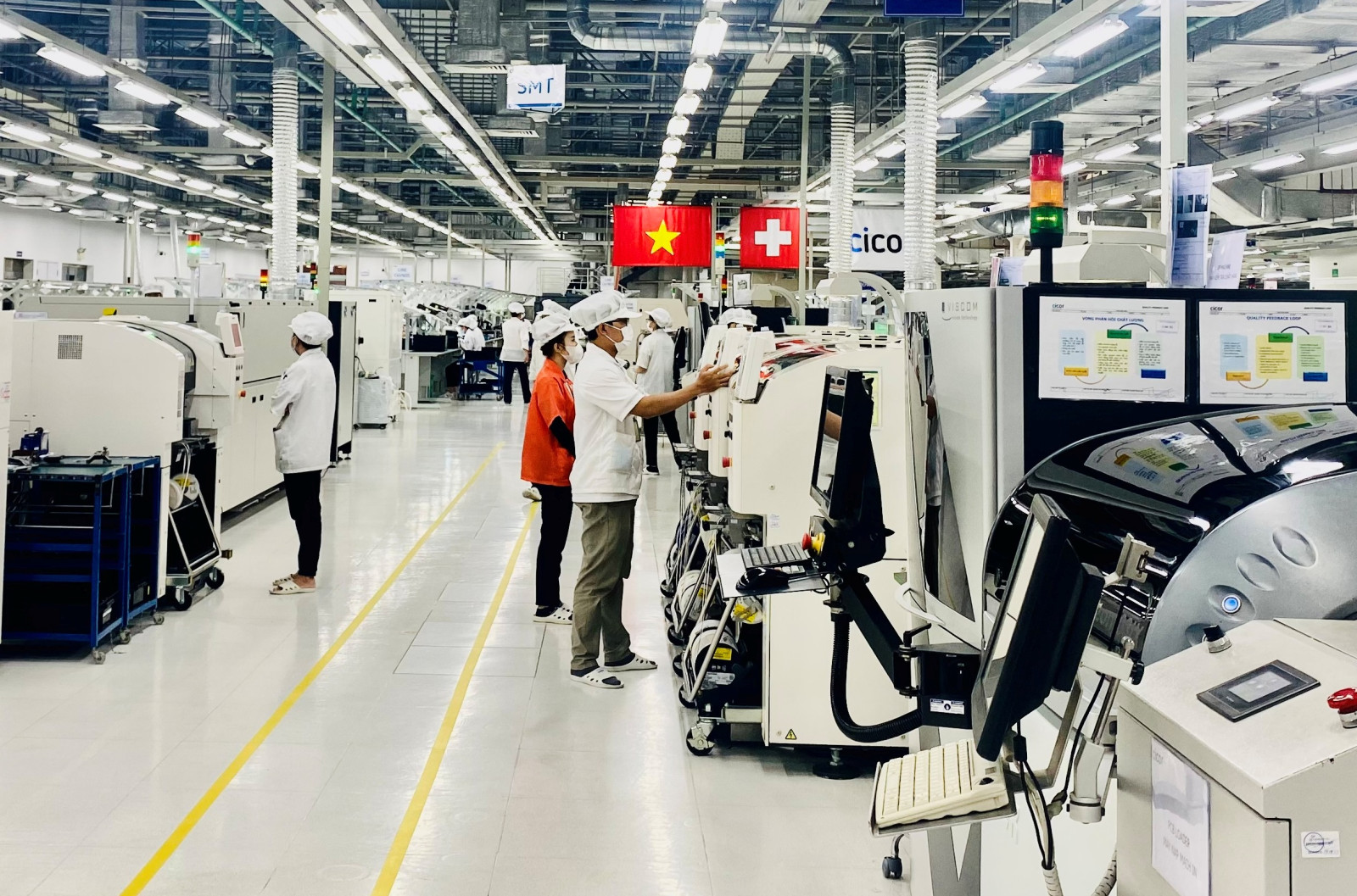Orders gradually increase, businesses strengthen production
Good signals from the market are starting to become clearer as orders return to many businesses, but difficulties still exist as businesses are forced to meet new regulations from the global market.

Binh Duong Garment Joint Stock Company accelerated production to meet the delivery schedule.
Positive signal
Nguyen Chi Trung, Chairman of the Board of Directors of Gia Dinh Group Joint Stock Company (Thuan An City), said that the company's production from the beginning of the year until now has been gradually improving as orders received have steadily increased. Up to now, the order received ensures workers will have job until next October. Thanks to that, at Gia Dinh Group's factories from the beginning of the year until now, workers have had overtime 5 days/week, 2 - 2.5 hours per day.
“In the difficult situation of the global economy, the company specializes in footwear products of average quality or higher and with high difficulty is an advantage. With current order developments, the company's production and business will increase by at least 30% compared to last year. To achieve this goal, in addition to traditional customer care such as the US and EU, Gia Dinh has expanded to the Japanese and Korean markets, and exploited niche markets such as South Africa and Mexico...", Trung said.
|
In the first 5 months of the year, the province's export turnover recovered well, increasing by 11% compared to the same period in 2023. Although lower than the national increase (16%), however, compared to other provinces in the Southeast region, Binh Duong has a good increase. The province's key export industries gradually recovered such as wood, wood products, textiles, iron and steel of all kinds... |
According to Mr. Nguyen Chi Trung, in the current context, the footwear export market in countries around the world has not recovered much. Gia Dinh's orders as well as other businesses in the same industry are mainly due to importers and brands moving from abroad to Vietnam. Enterprises in the leather and footwear industry are also making efforts to receive new orders, maintain traditional markets, and find niche markets after a year of sharp decline. To comply with new requirements from the market, businesses must upgrade technology and have specific plans to prepare resources to implement new requirements such as green energy and digital transformation to reduce costs. Besides, improving production and business models is also an urgent issue.
For the garment industry, orders also increased following the transformation of green businesses. Vu Thong Hiep, Head of Administration Department, Kung Kiu Garment Co., Ltd. (Tan Uyen City), said that from the beginning of the year until now, the company's orders have always increased steadily. Customers appreciate the factory's improvements in production processes and implementation of green commitments. The current factory has stopped using pellet boilers since early December 2023, switching to using electric irons ahead of schedule. At the same time, use a lot of natural light to protect workers' health. "In the coming time, we will strive to change and improve production, meeting the greening criteria set by brands to anticipate the shift of orders from foreign markets," Hiep added.
Solve challenges
Phan Le Diem Trang, Vice President of the Provincial Textile and Apparel Association, said that in the coming time, the textile and garment industry will have many opportunities but also many challenges. Market demand for textile products is expected to improve as Vietnam's major textile import markets are showing signs of recovery. However, with a series of difficulties from applying the EPR (extended producer responsibility) and CBAM (carbon border adjustment mechanism) as well as the "sustainable fashion" strategy instead of "fast fashion" is a big challenge for garment industry enterprises.

Businesses in Binh Duong focus on investing in new technology lines to meet development requirements. In photo: Manufacture at Cicor Vietnam Co., Ltd. (VSIP 1).
Phan Thanh Duc, General Director of Binh Duong Garment Joint Stock Company (Thuan An City), said that currently partners place small orders and fast delivery times instead of the 6 - 12 month import plan like before. Notably, although orders have increased again, the value of goods is low, while production input costs have increased, especially because they are still heavily dependent on imported raw materials. Businesses also need to change their management methods. They cannot manage in the traditional, command and manual style, but need to apply digital transformation in the management system, update information and make timely decisions to grasp and meet customer requirements.
“In the EU market, a series of regulations on ecological products, extended producer responsibility, supply chain traceability, carbon emission reduction requirements for manufactured products... have and will be implemented in the near future, requiring countries exporting to the EU market to comply. This is a big challenge for manufacturers, including Vietnam," said Duc.
|
Phan Le Diem Trang, Vice President of Binh Duong Textile Garment Industry’s Association: Currently, logistics costs are too high, causing domestic textile and garment enterprises' products to lose their competitive advantage compared to similar products in the world. Therefore, businesses hope the province will soon deploy logistics development directions, combined with new technologies, and apply new ways to reduce transportation costs. From there, it also reduces product costs, contributing to competition in the final price of the product to domestic consumers as well as exports. |
Reported by Tieu My - Translated by Ngoc Huynh
 Developing Bac Tan Uyen district into a town in the period 2030-2040
Developing Bac Tan Uyen district into a town in the period 2030-2040
 Accompanying investors for sustainable development
Accompanying investors for sustainable development
 Tan Uyen: Flexible adaptation, stable growth
Tan Uyen: Flexible adaptation, stable growth
 Tax revenue management boosted and modernized
Tax revenue management boosted and modernized
 To build synchronous infrastructure, facilitate new era development
To build synchronous infrastructure, facilitate new era development
 Bau Bang aims to become a center of innovation and industry
Bau Bang aims to become a center of innovation and industry
 Processing and manufacturing industry makes high efforts, gains good growth
Processing and manufacturing industry makes high efforts, gains good growth
 Enterprises assisted to enhance product quality and elevate competitiveness
Enterprises assisted to enhance product quality and elevate competitiveness
 Processing and manufacturing industry accounts for over 91% of foreign investment capital
Processing and manufacturing industry accounts for over 91% of foreign investment capital
 Strengthening removal of obstacles to promote socio-economic development
Strengthening removal of obstacles to promote socio-economic development





